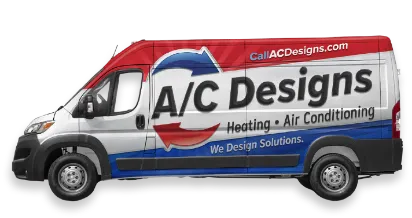How Carbon Monoxide Impacts Indoor Air Quality
April 14th, 2023At AC Designs, we’re committed to informing you about the hidden dangers of carbon monoxide and sharing practical tips to keep your indoor air safe and healthy.
At AC Designs, we’re committed to informing you about the hidden dangers of carbon monoxide and sharing practical tips to keep your indoor air safe and healthy.
Choosing the right system to heat and cool your home can be overwhelming. It’s normal to feel confused, especially when you come across unfamiliar AC terms. One common question we hear at AC Designs is: what’s the difference between heat pumps and normal air conditioners? Many homeowners don’t realize that heat pumps actually are a […]
Your HVAC system can help your Jacksonville home feel cooler or warmer as needed. However, you might notice that certain areas feel warmer or colder than others. Knowing how this might happen and what you can do to prevent it from occurring can help you keep your home feeling much more comfortable this season. Replace […]
As temperatures slowly get cooler in the Jacksonville area, you can expect to start using your heater soon. Before using it for the first time this season, though, you should make sure it’s in good condition. This helps ensure that you’ll have efficient heating in your home all fall and winter long. Don’t Switch From […]
Summer temperatures in the Jacksonville area make air conditioning a necessity. However, when you have a noisy a/c, running it can often be a nuisance. Thankfully, there are ways to reduce the amount of noise your air conditioning system makes, so you can enjoy a quieter and more comfortable home all season long.
While it might seem like you can replace one unit and leave the other in place, this usually isn’t recommended. Take a look at the three reasons why you should replace your indoor and outdoor units at the same time to ensure your Jacksonville home stays comfortable all year long.
High temperatures and humidity in the Jacksonville area mean it’s time to think about HVAC summer maintenance. Performing maintenance tasks help your HVAC system run more efficiently for lower energy bills and reduces the risk of repairs. Keeping your system in excellent condition helps ensure that you can look forward to walking into a cool […]
The heat and humidity in the Jacksonville area during summer can easily lead to skyrocketing energy bills. While you need to run your air conditioning in order to keep your home comfortable, you might not need to worry about high cooling bills. Keep the following tips in mind to help you save money and reduce […]
Winter is here and with it brings chilly homes, high heating costs, and leaving people to wonder if there are any money-saving steps they could take. The key to improved home comfort (and more money in your pocket) is understanding common heating mistakes you might be making and how to fix them.

Do we serve your neighborhood?